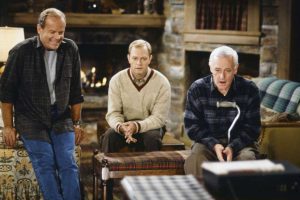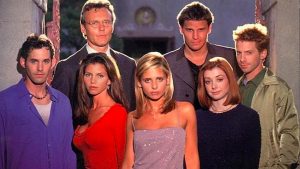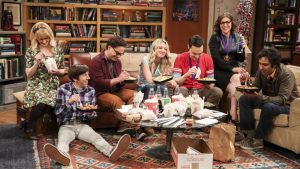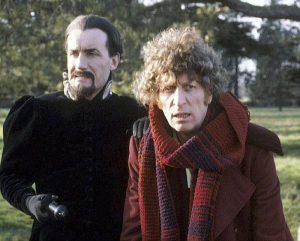What could be simpler than a week without TV? The idea of avoiding television completely – whether on a TV set, computer, tablet or mobile device – sounds like a straightforward, perhaps even liberating, challenge; and, in many ways, it was. For the purposes of writing this blog, I decided that I would not watch television for seven days (beginning Monday 13 May). I did so in the hope that a total absence of viewing might offer me better insight into the comfort and support that I normally derive from the small screen. In my PhD thesis, Comfort TV: Considering Everyday Viewing as a Mode of Self-Care (2019), I conducted research with audience groups (family units, first-year undergraduate students and hospital patients) in order to reflect on television’s value as an everyday emotional resource and companion. I now wanted to consider what regular TV viewing actually does for me (beyond entertainment).
Supporting my noble sacrifice, my wife Holly suggested that she would also give up her routine television viewing. Keeping track of our thoughts and emotions throughout ‘no TV week’ with short diary entries – as and when we each either thought about or felt some need for TV – in this blog I offer up a sample of our experiences and underline the comfort function and importance of everyday viewing. As it turns out, I could not have selected a better week during which to conduct this ‘microstudy’. Over the course of seven days, we would both experience a gamut of emotions. From receiving difficult news about the medical condition of my father – who was beginning his third week in hospital after a traumatic fall at home – to completing my thesis and sending it off to be printed. From filming my first wedding shoot – I own and produce projects for a small video production company in Glasgow – to several nights home alone as Holly worked multiple nightshifts at the local hospital. Hopefully what follows is of interest to many of you as I contemplate how relationships with TV fluctuate and evolve in light of shifting personal circumstances and experiences.
KC (Monday, 8:23AM): I miss TV. I’d normally be watching Frasier about now. Holly’s suggesting that we put some music on. She probably doesn’t deserve the grumpy face that her suggestion was met with.
Day one. I was immediately very conscious of breaking my typical routine, craving television (specifically traditional sitcoms) as the right start to my working day. There is something about their consistency and warmth that makes sitcoms like Frasier and Everybody Loves Raymond particularly reassuring and enjoyable. Without the laughter that they inspire or the structure that they provide in relation to my daily schedule (signalling to me when it’s time to start work), I found myself feeling a little adrift and frustrated. Holly was much more optimistic and positive about this temporary change to our lives. As the day progressed, she noted that she did not feel “as tired as normal”, spending much of her day off cleaning, listening to music, reading, and walking the dog. We also sat at our dining table during lunch, which rarely happens outside of special occasions, discussing the decoration of our baby’s room and the various things we need to purchase before he arrives in September.
While my day improved as I became busy, by the evening I was particularly tense and stressed. Largely due to my dad’s limited progress while in hospital – the confusion resulting from his trauma had still not diminished and we had to discuss the possibility of him not returning home – I was in need of distraction. My default would usually be to settle down and watch shows like The Big Bang Theory or Buffy The Vampire Slayer with my wife and our dog Alfie (can’t forget him!), but instead I worked longer into the evening and exercised later that night also. I very deliberately had to replace my TV viewing with other activities, which had the adverse effect of separating me from Holly and Alfie.
HC (Tuesday, 11:18AM): Struggling. All I wanna do is watch crap TV before nightshift. My definition of a lazy day is TV day, but today is just a day!
KC (Tuesday, 7:57PM): Interesting that on the day I finish my thesis for good, ready to submit it, I haven’t really thought about watching television at all. I’m a little more aware of it now because Holly is on a nightshift, but I’ve been to the shops, taken out the rubbish and tidied the flat a little, and am about to exercise again.
By Tuesday, the tables had turned. My wife often finds it difficult to sleep before a nightshift, so watches TV sporadically throughout the day. Rather than filling her day with activity and over exerting herself, she uses television as a comfort blanket of sorts; this combination of familiar faces, voices and narratives (always selecting a programme she has viewed previously) reassuring her and helping her to relax. The absence of television evidently had a greater impact on her that day, as it would on Thursday and Friday also when she had two further nightshifts ahead of her. As she notes, “When I’ve been on nights, I wake up and want to watch something and chill out. I’m getting bored and annoyed” (Friday, 1:51PM). In contrast, my positive day meant that I thought far less about television. I didn’t have that same desire to lose myself in my favourite shows or to cultivate a particular space/time in which to relax. Instead, I found myself more active and engaged completing other tasks and pursuing my other interests, and this trend continued for several days.
KC (Thursday, 8:11PM): I hate to say that I’ve kind of got used to this now. I’m not desperate to watch TV at the moment, although I do feel the flat is a lot quieter/I’m a little more self-aware than I might be otherwise. I’ve definitely filled the time with other things, so exercise, more work, a lot more screen time in general on my laptop or phone. I clearly do still crave some kind of connection though. I really wanted to watch an old episode of Doctor Who earlier, but I’ve sort of accepted I have to wait until Monday. It’s annoying but I can wait.
KC (Friday, 6:15PM): Stressful afternoon. I could do with watching an episode or two of Buffy with Holly and Alfie. I definitely feel a need for TV – like I’m not thinking about a specific story or anything like that but more how I’ll feel watching the show/the kind of atmosphere it will create and behaviour it will allow for. It means rest, closeness, warmth, no questions (which makes me sound antisocial, but I really just need to switch my brain off and recover before this wedding tomorrow). But I’m also anticipating laughter and entertainment. At this moment, I feel like it’s what I need to make me feel better.
By Friday, however, my situation had changed. While my dad had made a rapid – and quite unexpected – recovery in hospital and was told he could return home shortly, this was the culmination of what had been a very emotional and complex time for our family. The sense of relief that accompanied this news was also met with a level of realisation as to the strain we had all experienced over the preceding weeks. At the very moment when I wanted to relax most in front of the small screen, however, I was having to prepare for filming the following day. Filming, for me, is not usually accompanied by this level of anxiety but my colleague and I were keenly aware of the pressures of this particular type of shoot and the need to capture the ceremony (specifically, the bride and groom’s audio) perfectly.
It was at this point in the week that I fully appreciated the importance and value of my television viewing. While I had learned to embrace my time without TV, replaced by other activities and a sense of freedom in many respects – it was refreshing to shake up my routine – external influences made Buffy the Vampire Slayer seem like the most appealing retreat. I wanted to lose myself in that show, to be close to Holly and Alfie, but also to be able to forget my own reality for a while. I wanted to stifle the complicated emotions I had felt that week, along with my concern for the next day ahead. What made television and Buffy so appealing to me was the promise of a place and time which I would have control over (referring to both my living room and to the fictional town of Sunnydale on my television screen). Known characters and recognisable narratives (with resolutions), familiar sounds and visuals; their combination would cocoon me and provide the respite that I felt I needed. Television’s comfort is unique in that there is this constant interplay of visual and aural stimuli, both onscreen and off, sights and sounds and stories that are often familiar and inspire recollections of one’s past and/or some feeling of security. Normally, I would have relied on television as both entertainment and resource to help put me at ease and to find a way forward in these circumstances. Yet, instead I was left feeling anxious, frustrated and, once again, isolated.
HC (Saturday, 9:29PM): My friend came over and I cheated. I’ve watched movies all day and I feel so relaxed. Poor Kerr.
Nearing the end of our week without television, my wife relented on the penultimate day and watched several movies and back to back episodes of The Big Bang Theory with her friend while I was away filming (eventually, I forgave her!). As she notes above, she felt better for this, and while she decided not to view any TV programmes on the final day, she stated, “Today is alright because I watched TV yesterday, so it just feels like a normal day” (Sunday, 2:20PM). By this point for us both, I think that avoiding television had become more of an endurance test. There was no longer that same sense of urgency or frustration about the absence of TV as we would only have to wait another 24 hours before everything returned to normal. Our shared anticipation for catching up with our (current) favourite shows on Monday morning became a comfort in itself, reassuring us that TV would be back and that we would no longer be out of the loop/having to actively avoid spoilers online (I’m looking at you, Game of Thrones fans).
Conclusion
So, what did I learn from our week without television? Well, firstly, I do not need to watch as much TV as I currently do. While this statement might seem surprising considering my thesis reflects on everyday television viewing as a mode of self-care, I think that there are times when I gravitate towards television despite other, perhaps more active and/or satisfying alternatives being available; and I think the same is true for my wife. This is something that I mean to change from now on, to recognise when my viewing is about convenience (or perhaps laziness) as opposed to something more meaningful, safe or rewarding.
This being said, when Holly was working nights, I found myself utilising my time differently and I clearly felt a need to occupy myself and fill our home with sound and distraction. As I listened to podcasts and vinyl records, exercised and completed additional work – and found real satisfaction in these alternative activities – they temporarily replaced the companionship of TV and my need to be social “with” others. Television is undoubtedly a reassuring presence and I evidently rely on some programmes and viewing routines to either protect me whenever I feel vulnerable or to provide me with the right sorts of situations in which I can be together with other people (like Holly’s TV and movie day with her friend). Television can make possible important moments of connection, togetherness and interaction, as well as providing background noise or distraction when we need it most.
Finally, I think it is important to reiterate that on ‘positive’ days – by which I refer to the day I completed the writing and formatting of my PhD thesis and when I sent it away to be printed the following day – television became more of an afterthought. It was only on the days during which my situation changed, when I was faced with great upset or uncertainty or feelings of anxiety, that I imagined television to be the right sort of remedy. I felt that viewing would shelter me to some extent, transporting me elsewhere, and that it would help improve my resilience afterwards and give me some additional feeling of strength. I do not believe that all programmes are capable of doing this, nor every viewing situation. Yet, armed with my own cherished TV shows – Doctor Who, The Simpsons, Buffy the Vampire Slayer, Frasier, Thunderbirds, Friends, the list could go on – and positioned in my own living, ideally with my family nearby, television is capable of delivering this incomparable comfort and temporary focus.
Kerr Castle is a Film and Television Studies PhD candidate at the University of Glasgow. He designed and conducted an original research study with the NHS examining television’s contribution to the resilience and wellbeing of three distinct audiences (family units, first-year undergraduate students, hospital patients). He submitted his doctoral thesis in May 2019 – Comfort TV: Considering Everyday Television Use as a Mode of Self-Care – and is currently pursuing further publication and employment opportunities.










